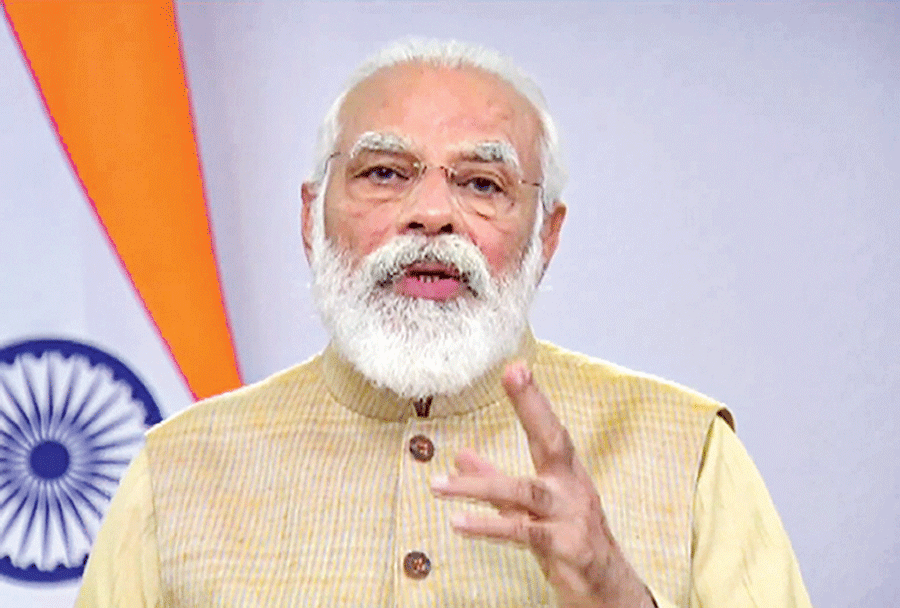Prime Minister Narendra Modi on Thursday launched a transparent tax platform and said the system of faceless tax appeals would come into force from September 25.
Modi also rolled out a taxpayers’ charter, which outlines the rights and responsibilities of both the tax officers and taxpayers. Analysts said the charter had laid out the principles only and must be supplemented by administrative orders.
The Centre has been pushing for a system to break down the interface between the tax officials and taxpayers. It has already started the system of faceless tax scrutiny — and the latest measures mark a step forward.
Mukesh Butani, managing partner at BMR Legal Advocates, said, “The tax statutes need an amendment to curtail the discretionary powers of the field officials because that has predominantly contributed to the current situation. The faceless assessment and appeal scheme shall act as a restriction on individual discretion, which in my view has caused the most damage with regard to harassment.”
The issue of alleged tax harassment by officers gained much attention after V.G. Siddharta, the founder of Cafe Coffee Day, committed suicide and left behind a note accusing the tax authorities of persecuting him.
Under the faceless appeal system, the appeals will be randomly allotted to any officer in the country. The identification of the officers deciding the appeal will remain unknown, and the taxpayer will not be required to visit the income tax office or the officer. The appellate decision will be team-based and reviewed.
The exceptions to the system include serious frauds, major tax evasion, sensitive and search matters. The system also excludes international taxation and the Black Money Act and the Benami Property Transactions Act.
Noted tax advocate Narayan Jain said “faceless assessments and appeals will remove the necessity of the personal appearance of taxpayers or their representatives. However, officials need to be fair and objective and decide the matters judiciously”.
Sudhir Kapadia, national tax leader at EY India, said, “As an immediate relief, it would be highly desirable if the CBDT instructs the release of all pending refunds to companies as quite a few companies are left with no choice but to consider approaching courts to expedite their refunds in this pandemic-induced stressful business environment.”
The income tax department has issued refunds worth Rs 71,229 crore in over 21.24 lakh cases till July 11, the finance ministry has said.
The Central Board of Direct Taxes (CBDT) has issued income tax refunds of Rs 24,603 crore in 19.79 lakh cases to individual taxpayers and corporate tax refunds of Rs 46,626 crore in 1.45 lakh cases to companies and all refund-related cleaning up of tax demands is being taken up on priority and is likely to be completed by August 31, the finance ministry has said. .
Through the charter document, the government has committed the following to the taxpayers: To provide fair, courteous and reasonable treatment; Treat taxpayer as honest; To provide mechanism for appeal and review; To provide complete and accurate information; To provide timely decisions; To collect the correct amount of tax; To respect privacy of taxpayers; To maintain confidentiality; To hold its authorities accountable; To enable representative of choice; To provide mechanism to lodge complaint; To provide a fair and just system; To publish service standards and report periodically; and To reduce cost of compliance.
The taxpayer charter also highlights the obligations of the taxpayer like To be honest and compliant; To be informed; To keep accurate records; To know what your representative does on your behalf; To respond in time; and To pay in time.
“The rights provided to the taxpayers through this charter intends to bring more clarity and provide good practices to the administration against providing stringent requirements in the income tax legislation with detailed mechanisms and processes to deal with breach of legal right. It may nevertheless be possible for taxpayers to seek its implementation contending that it ought to be binding on the administrating officers,” Kumarmanglam Vijay, partner, J. Sagar Associates, said.
Shailesh Kumar, Partner, Nangia & Co LLP said “the Taxpayer's Charter in its present form intends to bring qualitative change in the way Income Tax department functions and two administrative orders limiting interaction between tax officials and taxpayers has been issued immediately after release of Taxpayer's Charter. We can see similar administrative orders in coming days to further streamline the processes and to improve taxpayers' experience with the income tax department. The same may include fixing timelines on completion of proceedings, processing various applications filed by taxpayers, issuance of refunds in addition to timelines already prescribed in the Income tax act. Presently, the Taxpayer's Charter is more on principle and setting the overall theme, which will be supplemented by administrative orders to be issued by the CBDT in times to come,” he added.
Jain also said that under section 115BBE, aggregate tax is as much as 78 per cent from assessment year 2017-18. During demonetisation in December 2016 the rate was increased from 30 per cent to 75 per cent plus education cess. He demanded that the rate should be brought back to 30 per cent. The tax rates and Tax laws have to be fair and reasonable to ensure proper tax compliance, added Jain.











